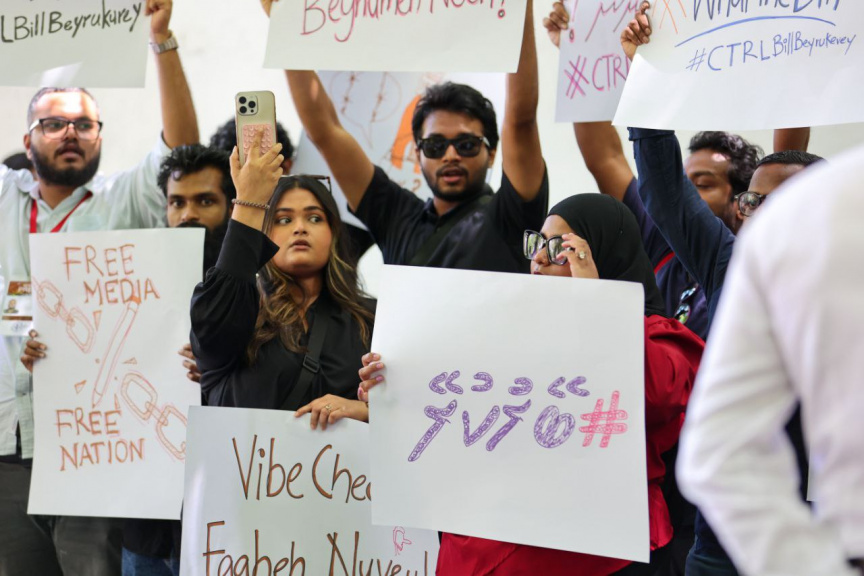
Journalists protest against the media control bill outside the Parliament building on August 27, 2025. (Sun Photo/Maaniu Mohamed)
The Independent Institutions Committee decided on Thursday to allow ten days for public opinions and three days for consultation with media outlets regarding a contentious media control bill submitted to the Parliament.
On August 18, Thulhaadhoo MP Abdul Hannan Aboobakr, an independent lawmaker aligned with the government, submitted a bill that seeks to dissolve the Maldives Media Council (MMC) and the Maldives Broadcasting Commission (BroadCom), replacing them with a single regulatory body — a seven-member Maldives Media and Broadcasting Commission (MMBC), composed of four members elected by the media and three appointed by the President with parliamentary approval, with the President also given the authority to appoint the commission’s head. It also empowers the MMBC to impose major penalties against media outlets as well as individual journalists, including during the investigative stage.
In an extraordinary sitting on Wednesday, the ruling People’s National Congress (PNC) used its supermajority to accept the bill into the Parliament and send it to the Independent Institutions Committee for review.
During a committee meeting on Thursday morning, members discussed how to carry out public and media consultations for the bill.
South Fuvahmulah MP Ibrahim Hussain, a lawmaker from the PNC, suggested having the bill open for public opinion until September 6, and setting a September 15 deadline for the bill.
Fellow PNC lawmaker, Kelaa MP Abdulla Shareef seconded the motion, commenting that it is an important bill.
The committee’s chair, Maafushi MP Hussain Riza Adam, who is also from PNC, suggested holding consultations with media outlets and other stakeholders over the course of three days starting from August 31.
“They are to also be allowed to submit opinions in writing,” he said.
Seconding this, Shareef commented that it is very important to hold extensive consultations with the media regarding the bill.
At the meeting, Felidhoo MP and PNC member Adam Zahir said there’s an urgent need to reform the regulatory framework for media.
“…And I support inviting representatives from all registered news outlets to hear their opinion and complaints, involving them in this process, getting it done between Sunday and Tuesday,” he said.
MP Ibrahim Hussain said that given the high public interest in the bill, he also finds it important for the committee to consult with the Human Rights Commission of the Maldives (HRCM).
“…And also, the Youth Ministry. This is also linked to a lot of young people who write and share a lot of posts on social media platforms and newspapers. It might therefore also be appropriate to consult with the Youth Ministry,” he said.
The committee voted in favor of opening a 10-day window for public opinion and a three-day window for public consultations.
In addition to allowing the President power over appointment of its members, the new bill also empowers the proposed commission to impose major penalties against media outlets as well as individual journalists, including during the investigative stage. This includes:
But while journalists' associations such as the MMC, the Maldives Journalists Association and even the International Journalists Assocuation protest against the new media bill as a threat to press freedom, it is backed by the government, which insists the legislature is designed to empower the press and protect press freedom.